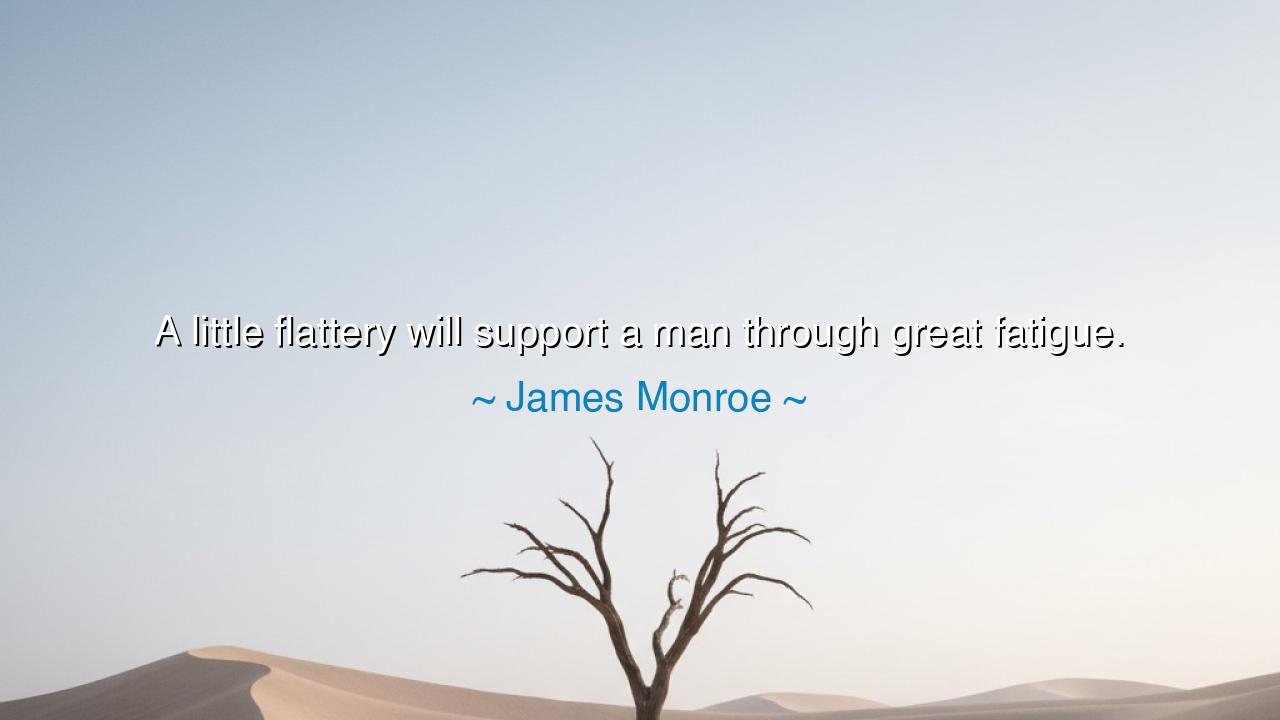
A little flattery will support a man through great fatigue.






"There is wisdom," said James Monroe, the fifth President of the United States, "in understanding the fragile strength of the human heart." His words, "A little flattery will support a man through great fatigue," are not shallow praise of vanity, but a deep observation of the soul’s hidden machinery. For Monroe, who led his nation through war and diplomacy, knew that courage often withers not from wounds, but from weariness — and that the gentlest touch of recognition, the smallest word of praise, can rekindle a fading flame.
To flatter, in its noblest form, is not to deceive, but to uplift. It is the art of seeing the good in another and speaking it aloud, of offering a man’s weary spirit a mirror that shows him not his exhaustion but his worth. Fatigue comes not only to the body but to the mind and soul — to those who strive, serve, and labor unseen. In such moments, a kind word becomes as precious as bread to the starving. It is not flattery in the sense of manipulation, but in the sense of encouragement — a warmth that reminds a person that their effort matters, that they are seen, that they are still capable of greatness.
Monroe spoke from the world of battle and governance, where men grew worn under the strain of endless toil. During the Revolutionary War, he himself marched with George Washington, wounded and frozen, surviving on hope and camaraderie. Among soldiers, praise was more nourishing than rations. When a commander would clasp a soldier’s shoulder and say, “You’ve done well, lad,” it could give that man strength to endure hunger, cold, and fear. That, Monroe knew, was the alchemy of words — their power to turn weakness into endurance, despair into courage.
In truth, every age has its weary hearts — workers, mothers, teachers, dreamers — all striving through their own invisible battles. Many fall not for lack of skill, but for lack of appreciation. A small flattery, when honest and kindly given, is like sunlight on a withering plant. Consider Abraham Lincoln, who carried the burden of a nation divided. He often wrote letters of gratitude to his generals, even when the war turned grim. “I am deeply grateful for your efforts,” he would write — and those simple words, more than medals, sustained their spirits. Monroe’s insight lived in Lincoln’s pen.
Yet, the ancients too understood this law of the heart. The philosopher Seneca once wrote that “praise nourishes virtue.” He meant that men and women grow toward the good when they feel that their good is recognized. To be told, “You are doing well,” does not inflate pride when spoken in sincerity — it anchors hope. For just as an athlete runs farther when cheered, so too does a weary soul push onward when praised.
But beware the poison disguised as flattery. Empty words, given for gain, destroy what they pretend to build. Monroe’s wisdom speaks not of deceit, but of genuine uplift. True flattery — if it can still be called by that name — is truth spoken gently, magnifying the light within another until they can see it themselves. It is a medicine, not a mask.
Thus, the lesson for all who live and lead is this: Do not withhold kind words. Speak them freely to those who strive beside you. Praise the effort, not only the success. Let your voice be the balm that eases another’s fatigue. In your family, your work, your friendships — remember that every soul you meet may be walking through some private battle, longing for one spark of warmth.
For in the end, a little flattery — when born of sincerity — is not a lie, but a gift. It reminds the tired that they are still worthy, still capable, still seen. And that small reminder, though light as breath, can carry a man — or a woman — through the darkest night, until the dawn returns.






AAdministratorAdministrator
Welcome, honored guests. Please leave a comment, we will respond soon